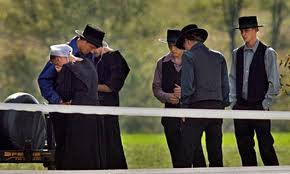Today is the Fourteenth Sunday after Pentecost. Here is my entry for this Sunday in my forthcoming book A Year of Faith and Philosophy.
Today’s gospel is the last of several Sundays spent in John 6, Jesus’s “Bread of life” discourse. A number of Jesus’ followers have finally had enough, complaining that “this teaching is difficult; who can accept it?” When Jesus responds with a few more of his patented cryptic remarks, “many of his disciples turned back and no longer went about with him.”
These frustrated former disciples have a point. I might have gone with them. The lesson is indeed a difficult one, including the claim that only those who drink Jesus’ blood and eat his flesh will have eternal life. But this is by no means the only difficult lesson that they’ve heard from Jesus. From selling all you have being a prerequisite for following him, and letting your enemy strike both sides of your face while giving him your cloak to go with the coat he stole, to letting the dead bury the dead and hating your father and mother if you want to be his disciple, Jesus is full of difficult teachings.
Small wonder that Christians, generally lacking the courage to simply walk away, tend to water down and systematize the radical elements of the gospel into manageable directives. These reduced commands require behaviors and commitments that, although burdensome at times, can be carried out by any reasonably dedicated and sincere adult. For many of us, “this teaching is difficult; who can accept it?” is not really a question of understanding at all. For we understand the hard sayings all too well, and conclude that they are just too much.
 In October of 2006, the news of a shooting in an Amish schoolhouse in Nickel Mines, PA burst onto the nightly news. A neighborhood milkman carrying a small arsenal of weapons walked into the school and started shooting, killing five and wounding many more before turning his gun on himself and committing suicide. In the midst of deep grief, the interconnectedness of the Amish community was demonstrated through comprehensive mutual support and, most shockingly, immediate forgiveness.
In October of 2006, the news of a shooting in an Amish schoolhouse in Nickel Mines, PA burst onto the nightly news. A neighborhood milkman carrying a small arsenal of weapons walked into the school and started shooting, killing five and wounding many more before turning his gun on himself and committing suicide. In the midst of deep grief, the interconnectedness of the Amish community was demonstrated through comprehensive mutual support and, most shockingly, immediate forgiveness.
At a prayer service the night after the shootings, a local pastor reported that he was in the kitchen of the shooter’s family home when an Amish neighbor came by. “He wrapped his arms around Charlie’s dad for an hour. He said, ‘We will forgive you.’” The pastor’s conclusion: “God met us in that kitchen.”
For several years I included this tragic event and its aftermath as the central part of the midterm exam in my General Ethics class. I provided my students with a newspaper account of the Amish community’s reaction to the shootings, then asked them to try to make sense of what happened within the parameters of the moral frameworks we had studied during the first half of the semester. They couldn’t do it.
Furthermore, many of my mostly parochial school educated students found something twisted, even offensive, in the willingness of the Amish community to forgive the murderer of their children. Comments ranged from “this is completely abnormal” to “these people are sick.” Yet one member of the Amish community included in the article: “Our faith tells us to act like Christ did on his way to the cross.”
Once shortly after reading my midterms I was having a beer with a colleague at the local watering hole on Friday afternoon, unwinding from the week. I described the reactions of my students to the behavior of the Amish. In response, my colleague said “I also am shocked by what the Amish did, but I don’t know why. As a Christian, I should be shocked that I’m shocked. They are just doing what Jesus said to do.”
As someone who has grappled with issues of Christian faith from my youth, my own temptation is to think of the Amish as über-Christians, somehow capable of moral heroics that normal persons such as I can only admire from a distance and not even aspire to. That rationale is particularly tempting because I, as many mainstream Christians, have been encouraged to think that it is the priests, pastors, monks, nuns, and missionaries who are the elite corps of Christians, freeing me to reduce expectations considerably.
But Jesus’ call to take up my cross and follow him does not contain a loophole or room for an amendment. Which brings me back to the beginning—“this teaching is difficult.” I can’t love my neighbor as myself. I can’t love God more than I love Jeanne. I can’t sell all that I have, give the proceeds to the poor, and follow Jesus. It’s too hard, and I’ve grown tired of pretending that a lukewarm, watered-down version is sufficient. Maybe I’m one of those who identify with the remaining disciples who asked, “Lord, to whom can we go? You have the words of eternal life.” So, where does that leave me? I want to follow. I can’t follow.
A still small voice offers a bit of hope. “Of course it’s too hard. Of course you can’t do any of these things. That’s the point. I can, and I am in you.” If divine love has indeed overcome the world, then perhaps it can even overcome me.













